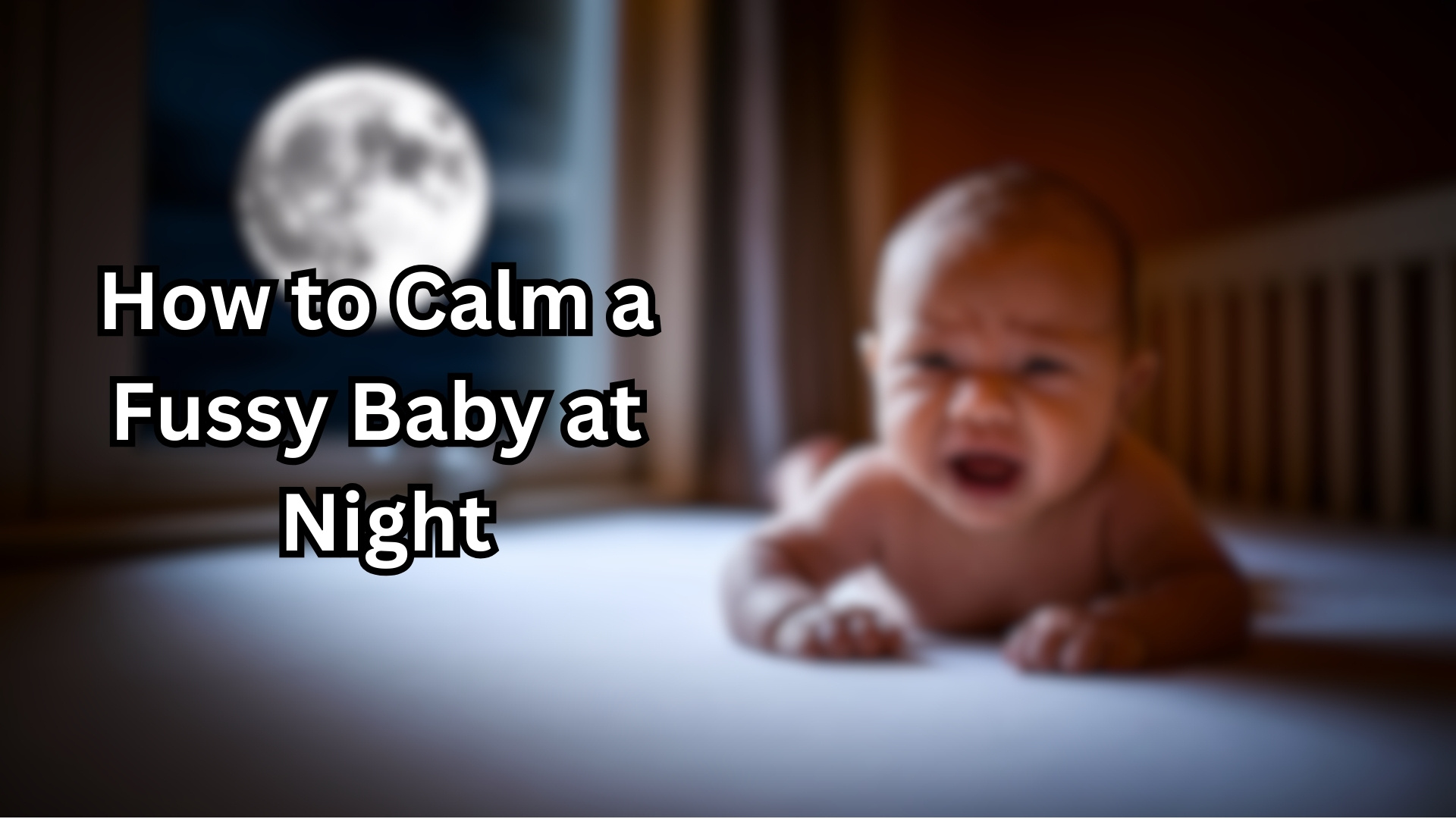
It’s 2 AM. The peaceful night is suddenly interrupted by your baby’s cries. Despite being fed, changed, and cuddled, your little one won’t settle down.
Maybe your baby is fussy – that overwhelming state of restlessness and irritability that leaves both of you exhausted.
Don’t worry—fussiness at night is completely normal for babies. It can happen for various physical and emotional reasons that little ones are still learning to process.
Many parents face these challenging nights, wondering what could be causing their baby’s discomfort.
Don’t worry; help is available! You’ll learn helpful tips and strategies to soothe your fussy baby and help in achieving the peaceful nights you deserve.
With a little patience and the right approach, those restless nights can become more manageable.
What is Night Fussiness in Babies?
Night fussiness is when babies become cranky, cry more, or seem uncomfortable during evening and nighttime hours. This behavior typically starts around 2-3 weeks of age and can continue for several months.
Many babies have a fussy period each day, often in the late afternoon or evening, sometimes called the “witching hour.”
Parents should know that night fussiness is completely normal and doesn’t mean you’re doing anything wrong. Almost all babies go through this phase as their tiny bodies and brains develop.
While it can be stressful and tiring for parents, remember that this challenging period is temporary.
Most babies outgrow night fussiness by 3-4 months of age as their nervous systems mature and they adjust to life outside the womb.
Common Causes of Night Fussiness in Babies

Many things can make babies fussy at night. Understanding these causes can help parents find ways to soothe their little ones.
- Overtiredness: Babies who miss sleep cues during the day may become too tired, making it harder for them to settle down at night.
- Overstimulation: By evening, babies can feel overwhelmed from all the sights, sounds, and activities they experienced during the day.
- Gas and Digestion Issues: Immature digestive systems can cause discomfort, especially in the evening hours.
- Growth Spurts: Babies eat more during growth spurts, which can lead to fussiness from hunger or digestive changes.
- Colic: Some babies have extended crying periods for no clear reason, often peaking in the evening.
Signs Baby Shows During Night Fussiness

Recognizing when your baby is experiencing night fussiness can help you address their needs quickly. Here are common signs that indicate your baby might be extra fussy during nighttime hours:
- Crying more intensely or for longer periods in the evening
- Arching their back and pulling up their legs
- Refusing to settle down even when fed and changed
- Seeming tired but fighting sleep
- Calming briefly when held but fussing again when put down
Understanding these signs will help you identify when your baby is experiencing normal fussiness and when something else might be causing discomfort.
How Different Age Groups Show Night Fussiness?
Night Fussiness may depend on the age too, and their reasons may vary. Here is some basic data about at what age the baby wakes up in the night and mainly for which reasons.
| AGE GROUP | NUMBER OF WAKEUPS (PER NIGHT) | HOW BABIES REACT |
| 0–2 months | 3–5 times | Cries for feeding, may fuss or squirm |
| 3–4 months | 2–4 times | Fussiness, hunger cues, short cries |
| 5–6 months | 1–3 times | Light crying, may need soothing |
| 7–9 months | 1–2 times | May cry, seek comfort, separation anxiety |
| 10–12 months | 0–2 times | Whining, may sit or stand in crib |
| 13–18 months | 0–1 times | Restless sleep, may cry or call out |
| 19–24 months | 0–1 times | May wake due to dreams or teething |
How to Calm a Fussy Baby at Night?

When your baby won’t stop crying at night, try these methods to help them calm down and sleep better. Both physical and emotional support can make a big difference in soothing your little one when they’re upset during nighttime hours.
Physical Support
- Use gentle rocking motions while holding your baby close to your chest to make them feel secure.
- Try swaddling your baby in a light blanket to create a feeling similar to being in the womb.
- Keep the room at a comfortable temperature (68-72°F) as babies can get fussy when too hot or cold.
- Use white noise machines or soft music to block out sudden sounds that might wake or startle your baby.
Emotional Support
- Keep your voice calm and soft when talking to your upset baby as they can sense your emotions.
- Maintain a regular bedtime routine so your baby knows what to expect each night.
- Hold your baby close and make eye contact to help them feel safe and loved.
- Try skin-to-skin contact, which helps regulate your baby’s heartbeat and breathing.
Remember that every baby is different, so you might need to try various methods to find what works best for your little one.
At What Age Do Babies Stop Crying at Night?

Most babies go through phases of nighttime fussiness, but this crying typically decreases as they grow older. Newborns often cry for 2-3 hours daily, with much of this happening during evening hours.
By 3 months, many babies develop more regular sleep patterns and may cry less at night.
At around 6 months, babies usually sleep for longer stretches and might self-soothe when they wake up. By 9-12 months, most babies can sleep through the night without crying unless they’re sick, teething, or going through a developmental leap.
Most children stop regular nighttime crying by 1-2 years old. However, every child develops at their own pace, and some may take longer to sleep peacefully through the night.
If your baby continues to cry excessively at night beyond 6 months, talk with your doctor about possible causes and solutions.
When to See a Pediatrician for Nighttime Crying?

For most babies, nighttime fussiness is normal and will pass with time. However, there are situations when speaking with a pediatrician is important.
Regular checkups allow doctors to track your baby’s growth and provide advice for common crying issues. But if you see some more signs, call your doctor right away.
Special Reasons to See a Doctor:
- Your baby has a fever over 100.4°F, unusual rash, or seems to be in pain
- Crying is accompanied by vomiting, diarrhea, or refusing to feed
- Your baby looks extremely drowsy, hard to wake, or less responsive than usual
Trust your parental instincts—you know your baby best. If something doesn’t feel right, it’s always better to check with a medical professional for peace of mind.
Final Notes
When your baby is fussy at night, it can feel overwhelming and exhausting. Remember that this challenging phase is temporary and will gradually pass as your little one develops.
Many babies go through periods of nighttime fussiness, and it doesn’t mean you’re doing anything wrong.
Trust your instincts as a parent. You know your baby better than anyone else. What works for one family might not work for yours, and that’s perfectly okay.
By following the steps mentioned above, you and your baby will eventually achieve a good night’s sleep. Be patient with yourself and your little one during this process.
With time, consistency, and lots of love, those fussy nights will become fewer and further between.
If you’re interested in more informational content on mothers and babies, feel free toclick here and explore other blogs that you might enjoy.
